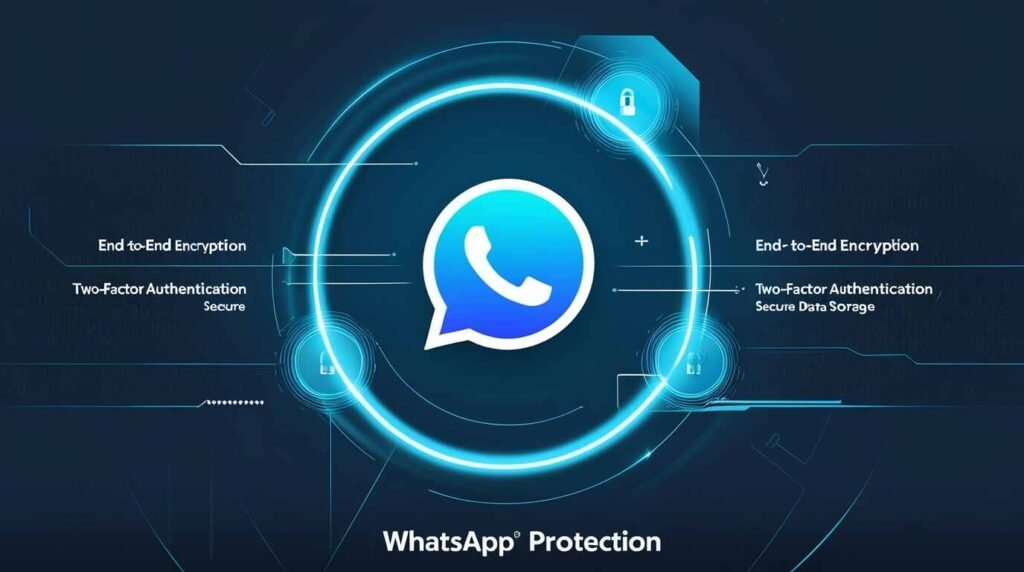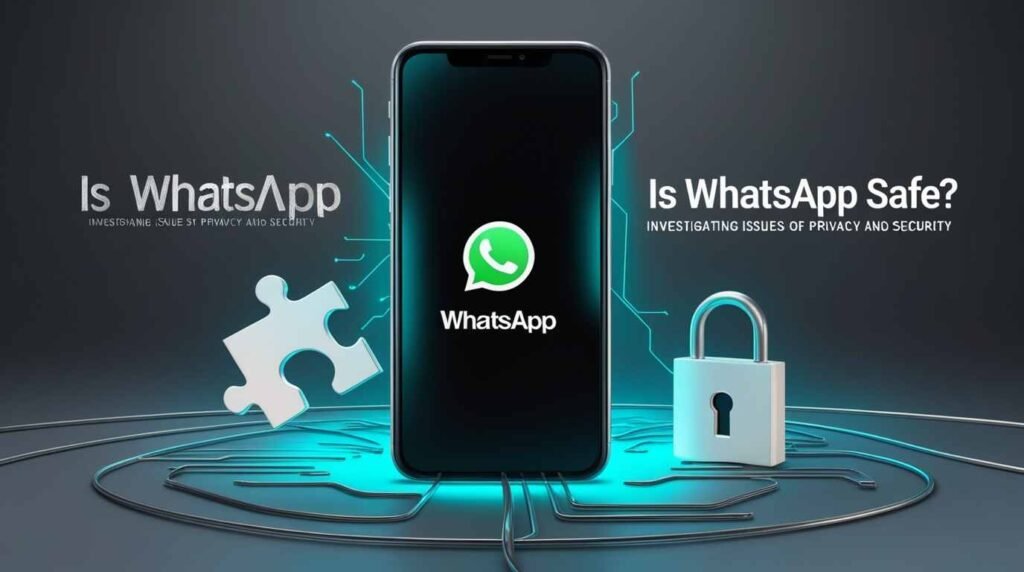Hello, beautiful people! Everyone uses WhatsApp nowadays. Do you know if your data is safe or not? Among messaging apps globally, W Hempel sets a benchmark for popularity. Over 2 billion individuals use it to communicate thoroughly, making it a chief option for both personal and work discussions. As WhatsApp gains in popularity, many privacy and security risks appear.
As users move through the digital world, problems focusing on safety and privacy have surfaced. Important topics cover data encryption, privacy measures, and WhatsApp’s parent company, Meta’s management of user information. We aim to investigate WhatsApp’s safety through the lens of encryption, privacy rules, and user defense methods.
The blog investigates WhatsApp’s safety, focusing on its quality and fault to raise user security standards.
Let’s get started!
Fundamental Aspects Of WhatsApp's Protection

WhatsApp uses encryption to protect all messages and shared media on its service. This encryption is enabled by the sender and recipient, who view only messages; WhatsApp does not have access to the content. The Signal Protocol offers impressive security features for this encryption.
End-To-End Encryption
What It Is: Using E2EE WhatsApp ensures only the sender and recipient can view the messages.
Concerns: While E2EE guarantees strong protection from records, supporters believe it limits law implementation actions during criminal investigations. WhatsApp continues to access metadata even though it encrypts the communication.
Data Collection And Sharing
User Data: WhatsApp acquires data comprised of phone numbers and information regarding devices. Users express concerns about privacy because the application’s parent company shares this data with Meta.
Policy Changes: Previous modifications to WhatsApp’s privacy policy created much danger and upset regarding data-sharing issues.
Security Vulnerabilities
Potential Exploits: Like other applications, WhatsApp is susceptible to security vulnerabilities. Dangerous techniques like spyware reveal dangers that permit intruders to access personal data.
Regular Updates: WhatsApp keeps improving its software to address vulnerabilities. Users should utilize the newest app for better advantages.
Group Chats And Broadcasts
Exposure Risks: Individuals can avoid dangers if they watch what information they share in group conversations. Group participants can look at messages and possibly send them out of the group.
Admin Control: The administration can manipulate group settings significantly; however, users need to observe what joining groups entails.
Privacy Settings
User Control: On WhatsApp, users can select privacy features to control access to their profile picture and other details. Many individuals neglect the opportunity to change these preferences.
Default Settings: Often, the default configuration fails to promote user privacy, prompting users to control their privacy settings.
Pros of End-To-End Encryption
Confidentiality: Before sending from your device, messages get encrypted, and only the recipient can decrypt them.
Integrity: This encryption stops anyone from changing messages while they are moving between devices.
Authentication: Messages transmitted through this encryption have been confirmed as coming from their intended source.
Common Privacy Concerns
Although encryption is powerful, many privacy worries persist regarding WhatsApp.
Data Sharing with Facebook
Since 2014, when Facebook introduced WhatsApp, discussions about data sharing between the two platforms have continued. Although WhatsApp says it focuses on user privacy, policies have been confirmed to authorize the sharing of user data related to phone numbers and usage metrics. There are inquiries about the application of user information and about the risk of targeted marketing.
Metadata Collection
Even if your messages’ content remains safe in WhatsApp’s hands, the platform collects data about communication partners and times spent chatting. The data may be valuable to advertisers and could be accessible to requests from governments. Critics say that although the message itself is secure, the metadata can still create major privacy challenges.
Vulnerabilities And Exploits
Every platform suffers from some form of risk. Over the years, WhatsApp has experienced multiple security issues, including the famous Pegasus spyware invasion. This invasion took advantage of the harm in WhatsApp to infect users’ systems with malware. This occurrence pointed out that despite end-to-end encryption, users remain vulnerable to intentional attacks.
Security Features Of WhatsApp
To improve user protection significantly, WhatsApp presents a range of security options.
Two-Step Verification
We strengthen protection by implementing two-step verification. With the feature activated, users need to add a PIN in combination with their password to lessen the chances of unauthorized access.
Security Notifications
When a contact changes their security code on WhatsApp, an alert is sent to users. This allows users to determine whether their talks were recorded or if their contact changed to another version of the app.
Disappearing Messages
The capability allows individuals to schedule messages so they disappear at a specific point, which decreases the likelihood of confidential data residing on devices or in a cloud storage service.
The Parents Failed To Recognize The Risk Found In The Messaging Tool.
Even though WhatsApp offers strong protection tools, users need to take steps to safeguard their privacy. Here are some best practices:
Keep Your App Updated
Updates frequently contain fixes for weaknesses. Update your application to get the most from the newest security improvements.
Be Aware Of Unknown Contacts.
Do not interact with unfamiliar contacts because they might be phishing attempts. Avoid messages from people you don’t know that seek your personal information.
Use Strong Passwords
Set solid and one-of-a-kind passwords for your WhatsApp account and set up two-step verification for better defense.
Limit Profile Visibility
On WhatsApp, users can select who sees their last-viewed details and status. Change these options to display information only to reliable friends.
Educate Yourself About Scams
Keep yourself updated on typical scams and Phishing efforts directed at WhatsApp users. Understanding the risks can help you avoid falling for a scammer.
The Protection Of WhatsApp Is Improving

- As technology progresses, cybercriminals modify their approaches. To ensure users’ safety consistently over time, WhatsApp has to innovate and strengthen its security strategies.
- The platform has started adding features, including biometric authentication and wider privacy options, to prove its focus on user protection.
- Users should contribute decisively to securing their account information. Acquiring knowledge about risks and practicing useful techniques may significantly reduce personal data risks.
- Through in-app alerts and website offerings, users can learn important privacy and security tips, including possible dangers and strategies for safeguarding themselves.
- Within the app, users can flag illegal accounts or messages for immediate attention.
- Users gain greater control over their relationships by being able to block contacts and improve personal security.
- The app partners with security experts and institutions to spot and resolve risks. This anticipatory method guarantees the app’s security from current dangers.
Conclusion
So, is WhatsApp safe? The answer is significant. Despite its security measures, users should be watchful of possible online threats and privacy challenges. To boost WhatsApp’s value and decrease threats, users should be mindful of possibilities and respond effectively.
End-to-end encryption guards WhatsApp messages so they remain private for everyone except the sender and the recipient. To shield themselves properly, users should deliberately choose their privacy selections and be aware of the app’s data usage.
Even if safe communication tools are available, safety is mainly shaped by user activities and knowledge. Users can greatly improve their safety by recognizing the risks, making active efforts while on WhatsApp, and retaining their privacy.
In a global environment where interactions happen constantly, being knowledgeable is vital for a secure web experience. Your safety depends on you; therefore, stay aware and be careful when speaking.
FAQ’S
- Is there a privacy and security threat with WhatsApp?
WhatsApp’s primary security objective is protecting all interactions with end-to-end encryption. The Signal Protocol, created by Signal Messenger’s team, is the foundation of WhatsApp’s safety.
- Can we share private details on WhatsApp?
Because of its end-to-end encryption feature, WhatsApp provides a secure environment for private messages. However, sharing sensitive data must be avoided, as encrypted backups might not exist, and metadata is collected.
- Is WhatsApp actually secure?
Any message sent through WhatsApp enjoys the same protection as Signal encryption, which secures communications before they leave your device.
- Do you face security concerns when using WhatsApp?
WhatsApp has certain security risks, including malware issues and scams. It allows you to chat with friends and family conveniently through messages and calls. You may be wondering whether you should continue using WhatsApp.
- Do hackers have the ability to view your WhatsApp?
Yes. Hackers can access a WhatsApp account without having your device. While WhatsApp restricts users to a single active phone number for the account, attackers can leverage malware to send all communications directly to their number.





